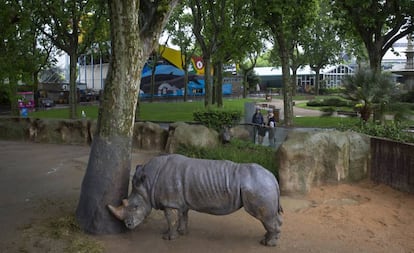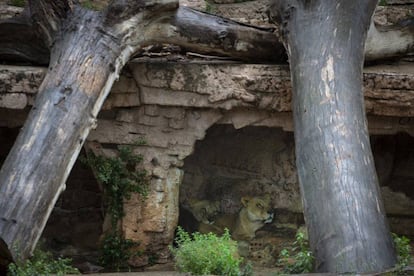Barcelona¡¯s push for an ¡°animalist¡± zoo signals end of a 127-year era
Animal welfare groups hail move phasing out most breeding programs, but conservation experts say initiative shows little understanding of how these centers help endangered species


The city of Barcelona has taken a historic step that signals the beginning of the end of the municipal zoo, at least such as it has existed in its 127 years of history.
Against a backdrop of growing sensitivity to animal rights, the city council has approved an amendment to the animal-protection ordinance, prohibiting breeding programs for species that cannot later be released back into their natural habitat.
They are ignorant of the role played by zoos in the conservation of endangered species
Martin Zordan, WAZA
The move was backed by Mayor Ada Colau¡¯s Barcelona en Com¨² group, by the Catalan European Democratic Party (PdeCAT) and by the Catalan Republican Left (ERC), and rejected by Ciudadanos (Citizens), the Catalan Socialist Party (PSC) and the Popular Party (PP).
This legal reform is the answer to a popular initiative called ZooXXI, sponsored by the animal welfare group Libera, which collected thousands of signatures to push for legislative change.
The council has also greenlighted a strategic plan that releases €65 million to upgrade the zoo facilities, parts of which date back to 1892. This financial plan was backed by all political groups, and will prioritize the conservation of Iberian and Mediterranean species.

Controversy
Most of the 2,000 specimens representing 300 species that currently live at the zoo will be transferred to nature reserves or cared for until their death. An exception to the breeding ban is made for species included in plans for reintroducing them into the wild. Right now, only 11 species meet this criterion, but zoo managers have been asked to produce proposals for other potential candidates. A scientific-ethical committee will be in charge of reviewing the list of candidate species for future breeding programs.
Sponsors of the move are celebrating the fact that Barcelona will have Europe¡¯s first ¡°animalist¡± zoo. ¡°Barcelona will be the first animalist zoo on the planet,¡± said ZooXXI sponsor Leonardo Anselmi.
This will allow us to deploy a zoo that we can all feel proud of
Deputy Mayor Janet Sanz
¡°This will allow us to display a zoo that we can all feel proud of, and which residents will enjoy for many years,¡± said Deputy Mayor Janet Sanz, who is in charge of environmental issues. This official said that employees¡¯ jobs would be guaranteed.
But Santiago Alonso of Ciudadanos noted that the amendment has received more than 300 complaints from the scientific community and universities. Organizations such as the International Union for the Conservation of Nature have criticized the lack of scientific rigor, while the zoo¡¯s 150 employees have gone on strike, fearing for their jobs and saying that the measure will shut down a park that has been in the city¡¯s collective memory for generations.
Buenos Aires precedent
While elephants, bears, camels, kangaroos and zebras will no longer be bred because they are not endangered species, those that are, such as orangutans, will get different treatment. Zoo managers will have to come up with a specific project for each of these species within a year, to determine whether zoo breeding would bring ¡°quantifiable benefits for the conservation and viability of the species,¡±?as well as ¡°the phases in which reintroduction into nature or population reinforcement will be carried out.¡± A committee and City Hall will have the final word.
The only similar experience with this kind of reconversion is the Buenos Aires zoo, which was turned into an ecopark. ¡°Citizens thought that we would transfer animals to sanctuaries straight away, but everything is slower than it seems,¡± says Tom Sciola, a manager at Argentina¡¯s former zoo. At the ecopark, visitors do not see the animals directly.

¡°The only ones that are bred are those with a program for reintroduction into nature: the Andean condor and the red-and-green macaw,¡± adds Sciola. Once all the animals have been transferred to sanctuaries and those who remain have died, the ecopark will keep breeding these two species until it is considered necessary. The facilities will also be used as a rescue center for animals that have suffered abuse or sustained injuries.
The Barcelona zoo currently has reintroduction programs for 11 species: the Majorcan midwife toad, lesser grey shrike, Hermann¡¯s tortoise, Montseny brook newt, dorcas gazelle, Eurasian spoonbill, common heron, Scops owl, Mediterranean pond turtle, monk vulture and griffon vulture.
The future of the other species will depend on the projects that are drafted by zoo management. Alejandra Garc¨ªa, of the animal welfare group Libera, says: ¡°Three years after the projects get drafted, any animals that cannot live in nature, such as apes, will no longer be bred, even if they are endangered. We cannot allow there to be animals wasting away in cages.¡±
But experts in zoo management have slammed the initiative, saying its sponsors have demonstrated little to no knowledge of the way these centers are run or what they do.
¡°They are ignorant of the role played by zoos in the conservation of endangered species,¡± said Martin Zordan, executive director of the World Association of Zoos and Aquariums. ¡°We want to be part of the scientific-ethical committee in charge of evaluating breeding criteria.¡±
¡°If we don¡¯t breed species in the long term, we will never know whether we might have reintroduced animals in future that cannot be released in nature today because they would immediately meet with death,¡± added Javier Almunia, president of the Iberian Association of Zoos and Aquariums.
English version by Susana Urra.
Tu suscripci¨®n se est¨¢ usando en otro dispositivo
?Quieres a?adir otro usuario a tu suscripci¨®n?
Si contin¨²as leyendo en este dispositivo, no se podr¨¢ leer en el otro.
FlechaTu suscripci¨®n se est¨¢ usando en otro dispositivo y solo puedes acceder a EL PA?S desde un dispositivo a la vez.
Si quieres compartir tu cuenta, cambia tu suscripci¨®n a la modalidad Premium, as¨ª podr¨¢s a?adir otro usuario. Cada uno acceder¨¢ con su propia cuenta de email, lo que os permitir¨¢ personalizar vuestra experiencia en EL PA?S.
?Tienes una suscripci¨®n de empresa? Accede aqu¨ª para contratar m¨¢s cuentas.
En el caso de no saber qui¨¦n est¨¢ usando tu cuenta, te recomendamos cambiar tu contrase?a aqu¨ª.
Si decides continuar compartiendo tu cuenta, este mensaje se mostrar¨¢ en tu dispositivo y en el de la otra persona que est¨¢ usando tu cuenta de forma indefinida, afectando a tu experiencia de lectura. Puedes consultar aqu¨ª los t¨¦rminos y condiciones de la suscripci¨®n digital.










































